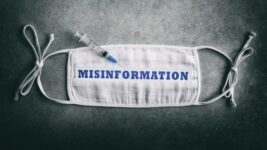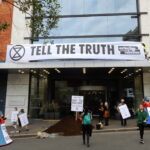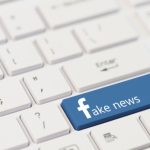Dispelling COVID Myths in the Age of Disinformation

The mass of conflicting information circulating online during the pandemic – or “plandemic”, if you prefer – has not only been exhausting for all, but it’s also contributed to a deep division forming in Australian society, which mirrors a similar divide that occurred in the US with the coming of Trump.
Take the prominent assertion that COVID vaccines or their mandating transgresses the Nuremberg Code, which is a post-World War Two guide to prevent involuntary experimental research being conducted on humans, as the Nazi regime had been performing in concentration camps.
The code contains ten ethical principles, which include that medical experimentation on humans must be consensual – via free choice, without coercion – that such research shouldn’t cause death or disability and that scientists must conduct any such tests.
The online rumour is COVID vaccines are experimental, so their use and mandating is against the code. However, COVID vaccines have been officially approved in Australia and overseas on a preliminary basis so, they’re not considered to be ‘experimental’ and the Nuremberg Code cannot apply to them.
In addition to this, the code is just that – a code of principles. It has not been enacted into international law, let alone the domestic laws of Australia.
The accompanying notion that vaccine mandates are akin to Nazism flies in the face of the Third Reich having actually relaxed long-term inoculation requirements that applied in Germany. It’s documented that the Nazis thought withholding vaccines would help destroy “inferior” peoples.
Unconstitutional measures
Another idea that’s been doing the rounds is that COVID restrictions, especially stay-at-home orders, clash with citizens’ rights that are protected in the Australian Constitution.
The rights most prominently cited as having been encroached upon are freedom of movement and that of association.
However, as the Australian Law Reform Commission makes clear, the nation’s founding document only protects “a handful of rights”.
Section 40 of the Constitution provides the right to vote. Section 51 (xxxi) contains the right to fair compensation if the government acquires property. Section 80 upholds the right to trial by jury. Section 92 sets out freedom of trade, commerce and intercourse between the states. Section 116 provides freedom of religion. And section 117 protects against discrimination due to state of residence.
The High Court has also found that the right to freedom of political communication is implied by certain provisions within the Constitution, which stipulate that as the nation is a representative democracy, senators and members of the lower house are “directly chosen by the people”.
Often it’s mistakenly thought that the Australian Constitution protects a multitude of rights in a similar manner to the US Constitution, which contains a bill of rights within it.
And whilst other nations, like the UK, Canada and New Zealand, have a standalone Act protecting citizens’ rights, our nation doesn’t.
Indeed, Australia is the only western democracy without a piece of legislation enshrining the rights of citizens in law at the federal level.
Recently, a number of Australian court challenges have been raised against COVID restrictions, claiming these constitutional rights have been impinged upon.
Most prominently, Clive Palmer challenged WA’s emergency border closure in relation to section 92 of the Constitution, however the High Court ruled the burden on the right was justified in cases of plague or epidemic.
State public health law
Some of the questionable assertions being made about COVID-19 restrictions relate specifically to NSW. These are in regard to the provisions within the Public Health Act 2010 (NSW) (the Act) that have led health minister Brad Hazzard to issue a plethora of public health orders since March 2020.
The most prominent piece of misinformation floating around is that the rules and regulations within public health orders are not proper laws, as both houses of parliament have not deliberated upon and passed them.
However, this is not the case, as the Act was put together to allow for laws to be swiftly passed by decree during public health crises, like COVID.
Section 7 of the Act provides the state health minister with a range of powers if they consider “on reasonable grounds that a situation has arisen that is, or is likely to be, a risk to public health”.
This allows the minister to take action or give directions via an order, which may declare the entire state or part of it a public health risk area, and within that area, they can reduce or remove the risk, segregate or isolate inhabitants, and prevent or “conditionally permit” access to the area.
There is also an idea circulating that for a public health order to apply to an individual it must first be served upon them.
So, for example, a police officer could not question or penalise a person for not wearing a mask, unless that individual has been personally given the public health order containing this requirement beforehand.
Yet, this isn’t the case either. Under section 62 of the Act, there is a requirement that an individual be personally served with a public health order before it legally applies, but this relates to person-specific orders that can be imposed upon those found to be suffering a certain medical condition.
These personal health orders must be written and can require an individual to refrain from certain conduct, undergo treatment or counselling, be placed under supervision, to undergo a test, as well as being required to notify the health secretary of anyone they’ve been in contact with.
An antivax mandate
Whilst questionable information about pandemic responses is circulating widely over social media accounts across the western world, over in Africa, the major concern is Big Pharma is refusing to extend the right to access lifesaving vaccines because nations are too poor to afford them.
Dubbed vaccine apartheid, this situation involves richer nations refusing to pause intellectual property rights for the pandemic, which would allow India and South Africa to produce vaccines at a price which would permit them to be distributed affordably throughout the Global South.
The Morrison government has finally come onboard with other WHO member countries in calling for the patent waiver in order to allow the poorest nations in the world to protect their populations against COVID-19. The nations continuing to oppose this are mainly European countries.
First world problems
A chief and early proponent in spreading false information about the COVID pandemic was Donald Trump. The former US president suggested taking unproven medications to treat the virus and derided mask wearing. Experts say his disinformation cost numerous lives.
This led conservative elements amongst the US government and the wider American public to champion antivax messaging and oppose public health measures.
So, as the Delta variant sweeps through that country right now, citizens over there aren’t launching court proceedings against health restrictions as in Australia, instead they’re now filing challenges to have state laws blocking public health measures revoked.
And in what must be one of the more bizarre incidents over the pandemic period, a group of antivax activists took to the streets of New York on Tuesday, waving Australian flags and chanting “free Australia”, as they demonstrated against the lockdown measures in place over here.
Hopefully, someone has informed these concerned New Yorkers that the lockdown in Greater Sydney is being lifted this Monday, so a more localised “free Melbourne” campaign might be formulated.







